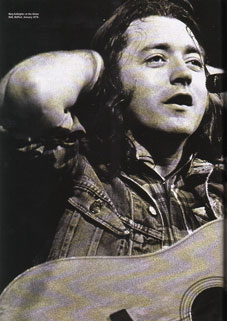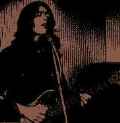
A soulful, passionate musician, Rory Gallagher was up there with the best white bluesmen. He was also, as his brother Donal and others confirm to Classic Rock, one of life's rare genuine nice guys.
Feeling blue: Dave Ling


 Given Rory’s aversion to gimmickry (which would
stay with him all his life), Taste favoured denims and long hair and
even scruffier blues-rock. The trio were enthused when record producer
Mervyn Solomon offered the trio the opportunity to make their first
demos. But with no prior consultation, several of the tracks they
recorded were actually released by Major Minor Records, which triggered
another of Rory’s aversions- record labels. The full sessions
eventually surfaced as “Taste: In The Beginning”.
Given Rory’s aversion to gimmickry (which would
stay with him all his life), Taste favoured denims and long hair and
even scruffier blues-rock. The trio were enthused when record producer
Mervyn Solomon offered the trio the opportunity to make their first
demos. But with no prior consultation, several of the tracks they
recorded were actually released by Major Minor Records, which triggered
another of Rory’s aversions- record labels. The full sessions
eventually surfaced as “Taste: In The Beginning”.
 De’Ath and keyboard player Lou Martin
enlisting. As another highly popular concert recording called ‘Irish
Tour ‘74’ confirmed, it didn't take long for the band to re-establish
their impressive brand of mental telepathy. McAvoy, himself a former
guitar player, swears that their unspoken communication came naturally.
De’Ath and keyboard player Lou Martin
enlisting. As another highly popular concert recording called ‘Irish
Tour ‘74’ confirmed, it didn't take long for the band to re-establish
their impressive brand of mental telepathy. McAvoy, himself a former
guitar player, swears that their unspoken communication came naturally.
 ‘Moonchild’, ‘Shin Kicker’, ‘Brute Force And
Ignorance’ and ‘Shadow Play’ to his already strong repertoire. But
prior to ‘Photo Finish’ Rory had chosen to scrap an entire album of
material, and relations with Chrysalis were beginning to sour, causing
him to sarcastically dub his next album ‘Top Priority’. Despite being a
strong, powerful rock record, a third live album, ‘Stage Struck’
pigeonholed his act at completely the wrong moment.
‘Moonchild’, ‘Shin Kicker’, ‘Brute Force And
Ignorance’ and ‘Shadow Play’ to his already strong repertoire. But
prior to ‘Photo Finish’ Rory had chosen to scrap an entire album of
material, and relations with Chrysalis were beginning to sour, causing
him to sarcastically dub his next album ‘Top Priority’. Despite being a
strong, powerful rock record, a third live album, ‘Stage Struck’
pigeonholed his act at completely the wrong moment.

 school in his birthplace of Ballyshannon has
recently been converted into an arts centre in his name, and each year
there are various tribute shows around the world. There are also
numerous fan-run Rory websites, one of the best being www.roryon.com.
school in his birthplace of Ballyshannon has
recently been converted into an arts centre in his name, and each year
there are various tribute shows around the world. There are also
numerous fan-run Rory websites, one of the best being www.roryon.com.
| "I was with Free when I first
saw Rory and I remember thinking: "God, what I wouldn't do to have that guy in this band." Paul Rodgers, Bad Company |
"A beautiful man and an amazing player. We will miss him very much" U2's The Edge |
| "Rory was a really big
influence. One of the all-time great guitar players. Playing with him in LA was one of my biggest thrills ever." Slash |
"One of the top ten guitar players
of all time, but more importantly one of the top ten good guys." U2's Bono |
| "Rory was such as purist. He
wouldn't sell out. He wouldn't do singles, he didn't want to do videos.
How many people in the music business today would have that kind
of stand. It's so dangerous" Gary Moore |
"Rory's
death really upset me. He was such a nice guy and a great player." Jimmy Page |
|
The Loop Mailing & Discussion List  |
|
|
|
|
|
|
| Forward
to next article |